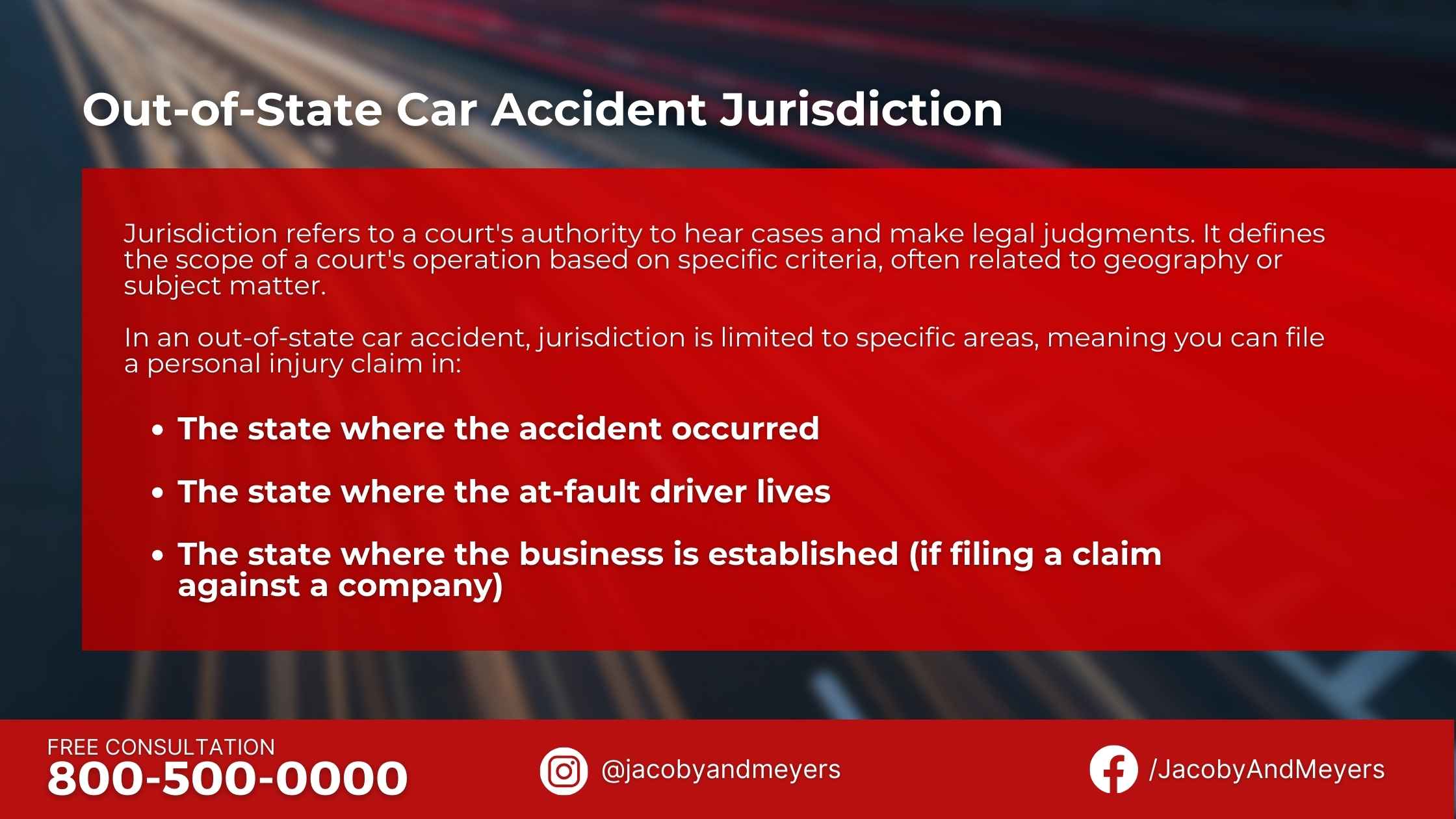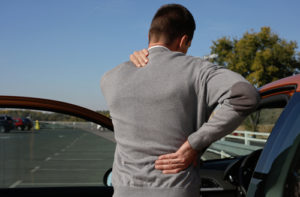In an out-of-state car accident, you may file a claim to receive compensation for the damages if it results from another driver’s negligence. However, to successfully do this, you must know the complexities of such a claim, such as which state you should file your claim in and what laws to adhere to depending on the state.
If a driver hits you in another state, this article will help you learn how liability works in such an accident and how to protect your rights.
What Constitutes Out-of-State Car Accidents?
An out-of-state car accident occurs when you travel or stay briefly in a state other than your home. People travel out of state for leisure, business, or other reasons.
Out-of-state car accidents can usually occur in two different scenarios, such as when at least one car is operated by a resident of another state or registered in another.
Moreover, because these accidents involve the rules and regulations of multiple jurisdictions, they can be highly complex from a legal perspective.
What To Do in an Out-of-State Car Accident in California
In a car accident in California, it’s essential to take the following measures to ensure safety, assist others, and protect your legal rights:
- Maintain composure and stay calm.
- Immediately dial 911 or contact the nearest California Police Department to report the incident.
- Check if you sustained injuries from the collision.
- If you have injuries, promptly seek medical attention by contacting the nearest California hospital.
- If safe, gather evidence at the accident scene, including obtaining the other driver’s contact information, taking photographs of the crash, and securing statements from any available witnesses.
- Fully cooperate with law enforcement officers during their investigation.
- Consider seeking guidance from a California car accident lawyer who can advise you on which state to file the claim and build your case.
Understanding Liability in Car Accidents in California
Before delving into the intricacies of out-of-state car accidents, you must first understand how liability works in car accidents in California. Typically, the driver whose actions caused the collision is liable for the damages. In such cases, their insurance company should cover expenses like medical bills, vehicle damage, and lost wages.
When filing a claim for a car accident in California, you need to show that the accident was due to the driver’s negligence by proving:
- The driver had a duty to ensure the safety of others on the road.
- The driver breached this duty.
- This breach caused the accident.
- The accident resulted in injuries and other damages.
For instance, a drunk driver hits you. In this situation, the driver’s DUI violation caused the accident. Hence, you can hold them accountable for the damages you sustain from the crash.
However, when pursuing a claim for compensation, remember that you must have evidence to show that the accident results from another driver’s negligence. In the example, you can demonstrate that the driver’s DUI violation caused the collision by having the following evidence:
- Photos of the accident scene
- CCTV or surveillance footage
- Witness testimonies
- Police reports
How Is Fault Determined in an Out-of-State Accident?
You can file a personal injury claim for compensation if a driver hits you while out of your state. However, you must understand the complexities a type of crash entails to protect your legal rights.

Out-of-State Car Accident Jurisdiction
Jurisdiction refers to a court’s authority to hear cases and make legal judgments. It defines the scope of a court’s operation based on specific criteria, often related to geography or subject matter.
In an out-of-state car accident, jurisdiction is limited to specific areas, meaning you can file a personal injury claim in:
- The state where the accident occurred
- The state where the at-fault driver lives
- The state where the business is established (if filing a claim against a company)
For example, if you live in Nebraska and travel to California, and a drunk driver from Alabama hits you in California, which jurisdiction should you follow? In this situation, you can file a claim in either California or Alabama – in California since the accident happened and in New York, where the at-fault driver resides.
Similarly, if a commercial driver hits you, you can file a claim in the state where the accident occurred or where the business is located.
Which State’s Laws Apply?
The state where you file a claim will determine the applicable laws.
In our example, let’s say you were drowsy at the time of the collision, making you partially liable for the damages. Since California follows pure comparative negligence, you can pursue a case for compensation even if you contributed to the occurrence of the crash.
On the other hand, if you file a claim in Alabama, you don’t have the right to a settlement since you are partly responsible for the damages. In Alabama, contributory negligence is followed, which does not allow victims to recover compensation if they contribute even 1% to the accident.
Statute of Limitations
The statute of limitations sets a deadline for filing legal actions, including personal injury claims. You lose the right to pursue the claim if you miss this deadline.
Most states, like California, have a two-year statute of limitations for personal injury claims. However, other states, such as Arkansas, Florida, Louisiana, and Maine, have different time frames ranging from one to six years.
Understanding the statute of limitations and other relevant laws is crucial, as failing to file within the required period can result in losing the right to take legal action.
Remember that you must determine the jurisdictions and statute of limitations depending on the state. While this can seem manageable, it can be challenging to understand and work around if you have injuries to recover from. Fortunately, a California car accident lawyer can help build your case by understanding which laws to follow depending on your situation.
Lawyer’s Tip: Attorneys have the expertise and resources to assess the situation and gather evidence when proving a case. They typically work with car accident reconstruction experts when limited or no evidence is gathered at the scene.
What Happens If the Out-of-State Driver Does Not Have Insurance?
If the out-of-state driver involved in the accident does not have insurance, it can complicate recovering damages. However, this does not mean you can’t recover compensation for the damages.
You may still be able to receive compensation for your losses or injuries even if the negligent driver does not have insurance, particularly if you have collision or uninsured motorist coverage.
Moreover, as an alternative, you can sue the at-fault driver to recover your losses through legal action. However, this strategy might not be the best choice. If the party liable is unable to pay for insurance, it can be more challenging for them to meet a settlement.
A California car accident lawyer can help you decide the best legal actions to take if an uninsured driver hits you. They will determine the jurisdiction to follow, identify the insurance to use, and negotiate on your behalf.
How Much is the Average Settlement for an Out-of-State Car Accident?
In addition to medical and property damage expenses, you can include other damages in your settlement. Consider the following losses when calculating your total compensation:
Economic damages are quantifiable financial losses that can be calculated using documents like invoices and receipts. Examples include:
- Past, present, and future medical expenses
- Costs for vehicle repair or replacement
- Lost wages
- Future loss of earning capacity
- Out-of-pocket expenses
Non-economic damages represent intangible losses from an accident that lack direct monetary value. These can include:
- Pain and suffering
- Reduced quality of life
- Anxiety
- Emotional distress
- Depression
- Post-Traumatic Stress Disorder
- Loss of love and companionship
Punitive damages are additional costs the court imposes when the liable party’s actions are particularly egregious or intentional.
Calculating economic damages is relatively straightforward, but valuing non-economic losses requires in-depth knowledge of personal injury claims. California car accident lawyers have the expertise to evaluate and quantify these non-monetary damages to ensure you receive the maximum possible compensation.
Moreover, these attorneys can review your case to determine if you qualify for punitive damages.
How Can a California Car Accident Lawyer Help Me?
Out-of-state car accidents can be challenging. What happens if you sustain severe injuries in a crash that occurred out of your state? Aside from recovering from your injuries, you must learn and understand the jurisdictions to follow depending on the state.
This is why contacting a California car accident lawyer is crucial to avoid jeopardizing your case. They can evaluate liability in your collision and advise on the best legal action to ensure fair compensation. An attorney can also:
- Examine the specifics of your case.
- Gather evidence to support your claim.
- Prevent legal errors during case management.
- Negotiate with the at-fault driver’s insurance providers.
- Protect your rights in court if necessary.
Jacoby & Meyers offers some of the most skilled and dedicated personal injury attorneys if you’re seeking a California car accident lawyer to protect your legal interests. They are committed to ensuring you receive the justice you deserve. While many firms assist with accident compensation, Jacoby & Meyers stands out due to its steadfast commitment to upholding your rights, making it the preferred choice for accident victims.
Since 1972, Jacoby & Meyers has been a strong advocate for the legal rights of accident victims, achieving substantial settlements. Our impressive track record, with over $2 billion in settlements, highlights our unwavering dedication to our clients.
If you’ve been injured in a car accident, Jacoby & Meyers is ready to help. We offer free consultations for injury victims and work on a contingency fee basis.
Jacoby and Meyers. Because You Deserve Justice.
Hear From Our Past Clients
Instead of relying just on our guarantees, consider what satisfied clients say about our services.
“Got into a collision. Obviously, it was the other party’s fault, and the different insurance companies were giving me a hard time with my claim. While driving, I saw the billboard Jacoby and Meyers and quickly submitted an online case evaluation. Thirty minutes later, I received a phone call from one of the attorneys, who took my information.
To make the story short, they were able to address my issues, and I received medical treatment. The other insurance party quickly paid for my auto damage, which resulted in the car being totaled.
About a year later, I finally got an email from the attorney stating that the other insurance party was willing to pay for the settlement. Overall, the service was excellent (accuracy, communication, and professionalism). I will definitely refer your law firm to all the people I know who need your service.”—Mher Pa.
Frequently Asked Questions
Do you have further questions regarding personal injury claims? We got you! Here are some frequently asked questions from injured victims that may help explain some aspects of your case.
- Does Insurance Cover Hit-and-Run Accidents?
- How To Document Witness Testimonies for Car Accidents in California
- What Happens If an Unlicensed Driver Hits Me?
- Can I Still File a Claim If I Have an Unfavorable Police Report?
Works Cited
“comparative negligence | Wex | US Law | LII / Legal Information Institute.” Law.Cornell.Edu. Accessed 18 June 2024.
“contributory negligence | Wex | US Law | LII / Legal Information Institute.” Law.Cornell.Edu. Accessed 18 June 2024.
“jurisdiction | Wex | US Law | LII / Legal Information Institute.” Law.Cornell.Edu. Accessed 18 June 2024.
“statute of limitations | Wex | US Law | LII / Legal Information Institute.” Law.Cornell.Edu. Accessed 18 June 2024.
Call or text 888-522-6291 or complete a Free Case Evaluation form








